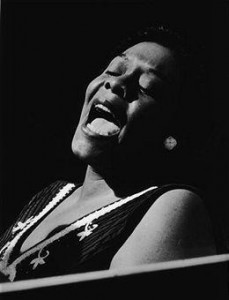Dinah Washington, Vocal jazz Artist

Dinah Washington (born Ruth Lee Jones; August 29, 1924 – December 14, 1963)
Dinah Washington was one of the most beloved and controversial singers of the mid-20th century; beloved to her fans, devotees, and fellow singers, but controversial to critics who still accuse her of selling out her art to commerce and bad taste. Her principal sin, apparently, was to cultivate a distinctive vocal style that was at home in all kinds of music genres, be it R&B, blues, jazz or pop, and she probably would have made a fine gospel or country singer had she the time. Her voice was gritty, salty and high-pitched, marked by absolute clarity of diction and clipped bluesy phrasing…
Born: Tuscaloosa, Alabama, USA
Genre: Jazz, Traditional Jazz, Blues, R&B, Pop, Gospel
Washington was well known for singing torch songs. In 1962, Dinah hired a male backing trio called the Allegros, consisting of Jimmy Thomas on drums, Earl Edwards on sax, and Jimmy Sigler on organ. Edwards was replaced on sax by John Payne. A Variety writer praised their vocals as “effective choruses”
Dinah Washington’s performed at the Newport Jazz Festival (1955–59), the Randalls Island Jazz Festival in New York City (1959), and the International Jazz Festival in Washington D.C. (1962), frequent gigs at Birdland (1958, 1961–62), and performances in 1963 with Count Basie and Duke Ellington.
She was one of the most popular black female recording artists of the 1950s”. She was primarily a jazz vocalist, but performed and recorded in a wide variety of styles (genres) including blues, R&B, traditional jazz and pop. She gave herself the title of “Queen of the Blues”, she was a 1986 inductee of the Alabama Jazz Hall of Fame, and was inducted into the Rock and Roll Hall of Fame in 1993.
Dinah Washington (born Ruth Lee Jones) was born in Tuscaloosa, Alabama to Alice Jones and moved to Chicago as a child. Her mother was a devoutly religious person who sang in the church and taught piano in the neighborhood. Dinah who learned to play piano at an early age became deeply involved in gospel and played piano for the choir at St. Luke’s Baptist Church while still in elementary school. In her teens while being a member of the Sallie Martin Gospel Singers she sang gospel music in church, played the piano and direct her church choir.
After winning a talent contest at the age of 15, she began performing in clubs. By 1941–42 she was performing in such Chicago clubs as Dave’s Café and the Downbeat Room of the Sherman Hotel (with Fats Waller).
She was playing at the Three Deuces, a jazz club, when a friend took her to hear Billie Holiday at the Garrick Stage Bar. The Club owner Joe Sherman was so impressed with her singing of “I Understand”, backed by the Cats and the Fiddle, who were appearing in the Garrick’s upstairs room, that he hired her.
During her year at the Garrick, she sang upstairs while Billie Holiday performed in the downstairs room. She acquired the name by which she became known, and credited Joe Sherman with suggesting the change from Ruth Jones, made before Lionel Hampton came to hear Dinah at the Garrick. Hampton’s visit brought an offer, and Washington worked as his female band vocalist after she had sung with the band for its opening at the Chicago Regal Theatre.
In December of 1943, she made her recording debut, “Evil Gal Blues” for the Keynote label. The song written by Leonard Feather was backed by Hampton and musicians from his band, including Joe Morris (trumpet) and Milt Buckner (piano). Both that record and its follow-up, “Salty Papa Blues”, made the Billboard “Harlem Hit Parade” in 1944 In December 1945 she made a series of twelve recordings for Apollo Records, 10 of which were issued, featuring the “Lucky Thompson All Stars.
Dinah stayed with The Lionel Hampton’s band until 1946. After the Keynote label folded, she signed with Mercury Records as a solo singer. Her first record for Mercury, a version of Fats Waller’s “Ain’t Misbehavin'”, was another hit, starting a long string of success.
Between 1948 and 1955, she had 27 R&B top ten hits, making her one of the most popular and successful singers of the period. Both “Am I Asking Too Much” (1948) and “Baby Get Lost” (1949) reached Number 1 on the R&B chart, and her version of “I Wanna Be Loved” (1950) crossed over to reach Number 22 on the US pop chart. Her hit recordings included blues, standards, novelties, pop covers, and even a version of Hank Williams’ “Cold, Cold Heart” (R&B Number 3, 1951). At the same time as her biggest popular success, she also recorded sessions with many leading jazz musicians, including Clifford Brown and Clark Terry on the album Dinah Jams (1954), and also recorded with Cannonball Adderley and Ben Webster.
Biographical information courtesy of Wiki; for more reading see link below.
https://en.wikipedia.org/wiki/Dinah_Washington
